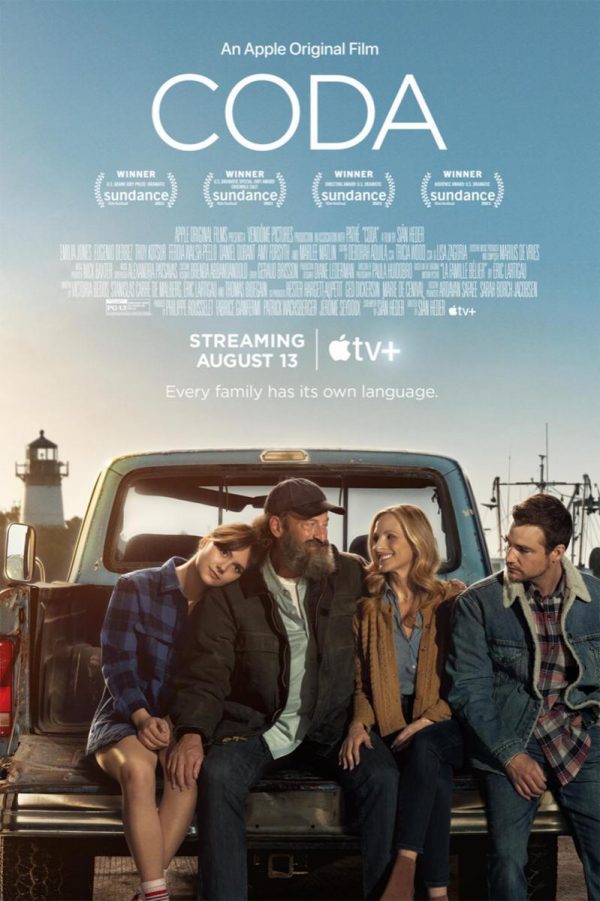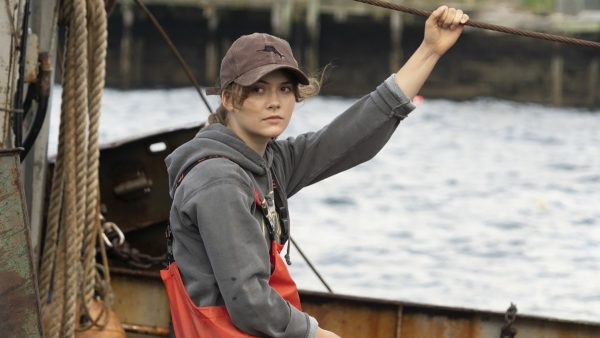Coda, 2021.
Written and Directed by Sian Heder.
Starring Emilia Jones, Eugenio Derbez, Troy Kotsur, Ferdia Walsh-Peelo, Daniel Durant, Marlee Matlin, Amy Forsyth, Kevin Chapman, John Fiore, Erica McDermott, Lonnie Farmer, Jose Guns Alves, and Armen Garo.
SYNOPSIS:
As a CODA (Child of Deaf Adults) Ruby is the only hearing person in her deaf family. When the family’s fishing business is threatened, Ruby finds herself torn between pursuing her love of music and her fear of abandoning her parents.
Emilia Jones is the breakthrough revelation of CODA deserving of rising star accolades. It will likely be talked about for the remainder of the year, just as writer and director Sian Heder’s film itself was the talk of this year’s Sundance. I will eventually get around to commenting on her immaculate performance as well, but in many respects, just as much spirit comes from the deaf parents and brother (the acronym CODA actually refers to a child of deaf adults), all of whom are played by deaf actors.
A family of four, they are a struggling but tight-knit group of fishers largely holding onto happiness and each other even in the face of financial uncertainty. For parents Jackie and Frank Rossi (portrayed by past Oscar-winner Marlee Matlin and stage star Troy Kotsur), that’s enough. The married couple consistently remains infatuated with one another emotionally and sexually (the latter leads to some embarrassing hilarious situational humor that doesn’t feel cheap or insensitive as the script has a delicate touch that ensures we are only laughing at the situation and not the disability) and have no real desire to make non-disabled friends. It doesn’t help that most of their peers (a small town in Massachusetts seemingly without much education or willingness to understand those that are different) also have no interest in learning ASL for communication or getting to know one another better.
On some level, even if the surrounding people were kinder (and to be fair, not everyone is an asshole here), it would still be reasonable to accept why the Rossi parents would prefer sticking to themselves, focusing on their work (which involves limited interactions with other people that comes with the con of getting ripped off when selling the fish), and living with a tribal mentality. The world out there already sucks, and it sucks more for disabled people. There’s nothing wrong with eking out a living doing what your father and grandfather did, passing down those skills to your children.
This will also be a perspective that varies from individual disabled people, but it’s also not easy to work up those nerves and ingratiate oneself inside a conversation among non-disabled people. Of course, some are more outspoken and willing to stick out, but I can only speak for myself as someone who has always found it difficult to shed shyness even when I’m around people I know who clearly accept me. With that said, one of the most emotional elements of CODA comes from watching them fight for independence, take on new responsibilities, and make themselves known after somewhat living invisibly.
The children of Frank and Jackie, Ruby and Leo (with the former being played by Emilia Jones and worth pointing out once more just how astonishing her workers here, and Daniel Durant playing her deaf brother) share that unbreakable family bond with more of a dare to take risks. At one point, the family decides to sell fish for themselves, effectively cutting out the middleman, which sparks fear and concern in the parents as they wonder who would be willing to learn how to communicate with them to settle transactions. Leo has one of those responses that should stick with anyone for as long as they live; it should be on them to learn, not us.
As fascinating as they are to observe and understand, the heart of the story comes from Ruby, who is an extension of this disability while able to speak normally. Rather than take on a caretaker role, she serves as the interpreter for her family whether it’s on the ship (listening in on radio calls and the surroundings), a news station that wants to do a story on the family for breaking off onto their own, and transactions walking the line between doing what’s expected of her and sticking up against how shamelessly willing buyers are to take advantage of the disability offering unfair wages.
She has also decided to sign up for choir, showing great promise in practicing under the tutelage of Bernardo Villalobos (Eugenio Derbez, giving what has to be his best English-speaking performance to date, one that plays to his witty comedic strengths while allowing room for some moving dramatic work). After some engaging scenes of Bernardo pushing Ruby to quell that fear inside her and sing with passion (it’s clear that while she doesn’t want to be tending to her family as an interpreter for her entire life, she’s nervous in her own way to put herself out there in society), she is paired up with Miles (Ferdia Walsh-Peelo, another bright young talent deserving of more recognition for his incredible performance in Sing Street) to perform a duet of “You’re All I Need To Get By.” The problem with that is Miles associates with a nasty bunch that takes pleasure in bullying Ruby for coming from a deaf family and not having always had a normal speaking voice. Beautifully, Bernardo encourages Ruby to embrace that so-called ugliness to create something unique of her own identity. It’s also not a spoiler to say that her talent could go to waste if she doesn’t seek out a scholarship, even if it means moving away from holding the family business together.
Naturally, the song lyrics (it’s also not the only one sung throughout the movie that speaks to the characters and narrative) reflect the story, but there’s a choice bold sound design decision during a performance of Ruby that her family attends. It’s the kind of moment that’s willing to sacrifice entertainment to offer a glimpse into the lives of deaf people, and a sequence so thoughtfully and carefully constructed it’s also enough to get the tears flowing. Adding on to that, the last 30 minutes of CODA are a game of holding back or succumbing to crying.
That’s also somewhat of a miracle to say, considering CODA has the plot trajectory, coming-of-age intricacies, and feel-good tone of what’s expected to be played at Sundance. There are also moments here that, in lesser capable hands, would take moments that could still be seen as slight emotional manipulation, but done here without milking them for all their worthwhile draining all sincerity from the character work. Essentially, certain lines and situations I normally would have scoffed or rolled my eyes at had a major impact here, which probably speaks to Sian Heder’s skill to maintain authenticity.
There are one or two subplots that could either be cut or maybe be expanded by a few minutes, but otherwise, CODA is confident and proud filmmaking that transcends familiarity by further layering the family dynamics here as the story goes on. In a year when plenty of movies (including major blockbusters) are pushing the importance of family, CODA does it most potently with a stellar ensemble examining the positives and negatives of a complex, life-changing family situation.
Flickering Myth Rating – Film: ★ ★ ★ ★ / Movie: ★ ★ ★ ★
Robert Kojder is a member of the Chicago Film Critics Association and the Critics Choice Association. He is also the Flickering Myth Reviews Editor. Check here for new reviews, follow my Twitter or Letterboxd, or email me at MetalGearSolid719@gmail.com















